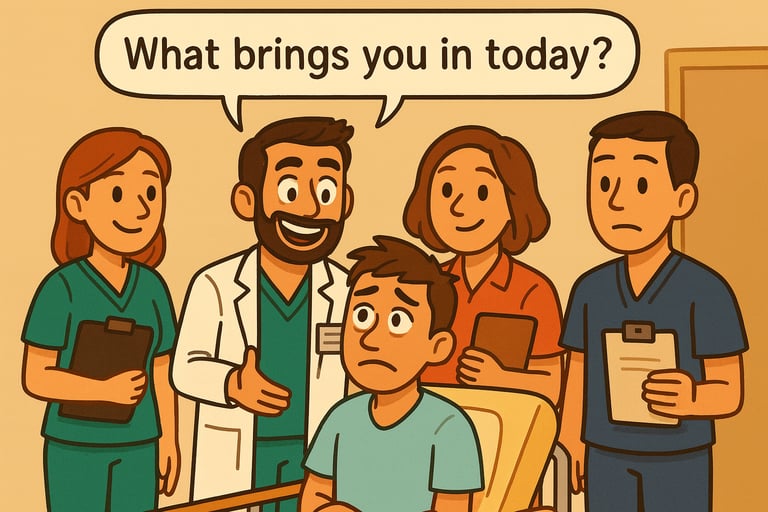Why Do You Keep Asking the Same Questions? The Method Behind Our Medical Madness
Ever wonder why every person in the ER asks you the same questions? From registration to your doctor, there's actually a method to our madness and it's designed to keep you safe and get you the proper care faster.
9/4/20254 min read


Why Do You Keep Asking the Same Questions? The Method Behind Our Medical Madness
Picture this: You've just arrived at the emergency department with chest pain, and you're already on your fourth rendition of "why you're here today." The registration person asked. The triage nurse asked. The tech asked. Now here I am, your friendly neighborhood emergency physician, asking the same question again. I can practically see the steam coming out of your ears as you think, "DIDN'T ANYONE WRITE THIS DOWN?!"
Trust me, I get it. If I had a dollar for every eye roll I've received after asking, "So what brings you in today?" I could probably afford that fancy coffee machine in the doctor's lounge (spoiler alert: it's still broken).
The Great Communication Chain (Or: Why Your Story Gets Told More Times Than a Family Legend)
Here's the thing – each person you encounter on your ER journey has a very specific job, and they need very specific information. It's like a relay race, except instead of passing a baton, we're passing your story, and each runner needs to examine that baton from a different angle.
Registration: These heroes at the front desk want your story in Twitter-length format. Think "chest pain," "twisted ankle," or "swallowed fidget spinner" (yes, that's a real thing, and yes, adults do it too). They need something short and sweet (ideally under five words) to get you into the system. They're not trying to solve your medical mystery; they just need to know which department you belong in and whether you need a wheelchair.
Triage Nurse: Next up is your triage nurse, who wants a slightly longer version of your story, but it should still be brief. They're focused on getting your vital signs and figuring out just how urgent your situation is. They're essentially playing medical detective, assigning you an acuity level from 1 to 5. Level 1 means "drop everything, this person has no pulse!" (cardiac arrest level drama), while Level 5 is more like "I need a prescription refill" (which, let's be honest, probably could have waited until Monday). This triage process ensures that the person having a heart attack gets seen before the person with a hangnail, no matter who arrived first. You'll get to tell your whole story later, DON'T WORRY!
The Physician/PA/NP: Finally, you get to me (or one of my awesome PA or NP colleagues). This is where your story really matters. I want the full director's cut with the extended edition, with deleted scenes and commentary. I need to understand not just what happened, but when it started, what makes it better or worse, what you've tried, your medical history, and whether your great auntie Gertrude had something similar back in 1987.
But Why Can't You All Just... Talk to Each Other?
You'd think in our age of smartphones and smart cars, we'd have smart medical records that perfectly communicate everything seamlessly. Unfortunately, our electronic medical records are like a giant group chat that no one scrolls back to see what was said.
Each person along your ER journey has specific documentation requirements, and there's often an overlap. Despite years of technological advances and numerous attempts to streamline the process, emergency medicine still involves a significant amount of redundant questioning. It's not because we enjoy being repetitive, trust me, we want to get to the bottom line as much as you.
The truth is, we do my best to chat with your nurse and review what everyone else has documented before I walk into your room. But here's the kicker... I also want to hear it straight from you. Why? Because sometimes details change, get lost in translation, or new symptoms pop up between registration and when I see you.
The Silver Lining: Your Story Gets Really, Really Good
Think of telling your story multiple times as an unexpected benefit: it's like rehearsing for a performance. By the time you get to me, your story is polished, organized, and you've figured out which details are actually important. You've gone from "Um, well, it started maybe yesterday? Or was it Tuesday? Anyway, it hurts..." to a crisp, clear narrative that helps me help you faster.
Plus, repetition acts as a safety net. If you forgot to mention that crushing chest pain to the registration person but remember it when talking to the triage nurse, we've caught something important. If you initially said the pain was "mild" but by the time you see me, it's "excruciating," that tells me something significant about how you're progressing.
The Bottom Line
So the next time you find yourself telling your medical story for what feels like the hundredth time, remember that each person asking has a specific purpose. We're not trying to drive you crazy (that's just a happy accident). We're trying to make sure nothing falls through the cracks and that you get the right care at the right time.
And hey, at least you're getting really good at telling your story. Hopefully, with the upcoming Electronic medical records technology, the gaps in communication will be less frequent
P.S. – We promise we're all taking notes. We just might need to hear it one more time to make sure we got it right. Thanks for your patience with our beautiful, chaotic, life-saving madness.